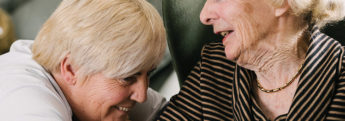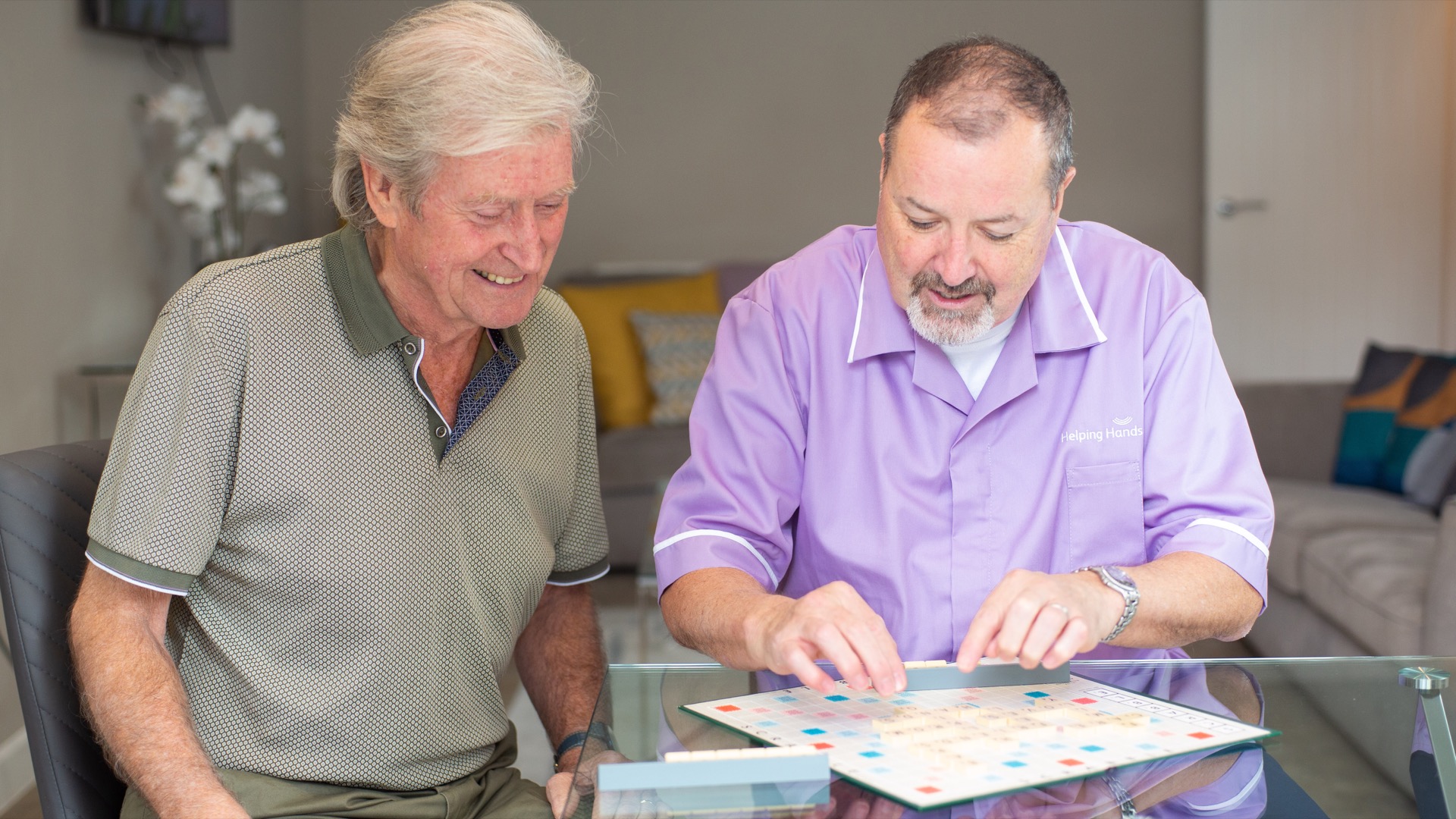Read our guide to dementia care at home
As the nation’s leading provider of specialist dementia care at home, we’ve pulled together some of the key facts about the condition and how you and your family can meet your loved-one’s needs.
Helping Hands is a home care provider with more than two decades’ of experience in providing dementia care. We’ve delivered care to many hundreds of families affected by the condition, all with the belief that with the right care and support in place there is never a need to leave home.
This guide has been put together to help you cope with the changes dementia brings to your lives, and the lives of loved ones who are living with dementia. It contains dementia care ‘top tips’ and advice, and lots of information about how dementia affects the brain and body. It will help you understand how your loved one with Dementia perceives the world around them.
Download our dementia care guide
You can download and print the following information in our essential guide to dementia. For more information about caring for someone with dementia, call us today, or you can request a callback and we will call you.
Dementia care guide
There are at least 800,000 people living with dementia in the UK. Many are looked after by family members or other unpaid caregivers. More than half of those providing dementia care at home have received no help with key issues like personal care.
Within this guide you will find useful information including:
- What dementia is and how it affects the brain
- How dementia affects memory
- How to make sure needs are met
- How to interact with people with dementia
Understanding dementia: what is dementia?
Dementia is caused by damage to the brain. It usually affects the brain cortex (the ‘thinking bit’). Damage increases over time, which makes the symptoms get worse – but every person is different, and symptoms will progress at a different rate for each individual.
Typically, symptoms include memory problems, communication difficulties, and difficulty carrying out everyday activities.
Currently, there is no cure for dementia. However, charities like Alzheimer’s Society are funding research into treatments. There are also drugs available to help slow the onset of certain Dementia types.
Types of dementia
There are more than 100 types of dementia. Alzheimer’s is the most common. More than 60% of people with dementia have Alzheimer’s.
Different types of dementia affect different parts of the brain. Because each part of the brain has its own job, like dealing with speech or memory, symptoms vary depending on the type of dementia a person has.
People with Alzheimer’s may have trouble making sense of orientation, place and time, for example. Those with Lewy body dementia may become aggressive, and need regular reassurance, as they can quickly become confused and disorientated.
Points to remember
- Dementia can also affect the nervous system. This means the person affected may find it more difficult to sense things around them.
- They may have trouble distinguishing between hot and cold. This might make them do things that appear unusual, like eating food straight from the freezer.
- Their sense of touch may become weaker. This means they may drop things, or find it harder to carry out fiddly tasks, such as doing up the buttons on a shirt or blouse.
The 7 stages of dementia
Stage 1: Appears normal and can cover up lapses
Stage 2: Forgets certain things but can otherwise function normally
Stage 3: Difficulties at work, become anxious & family becomes aware of deterioration
Stage 4: Reduced ability to count, finds travel difficult & can no longer manage their own affairs
Stage 5: Needs help getting dressed
Stage 6: Needs help eating, using the toilet & may be incontinent, disoriented & possibly forget identity
Stage 7: Severe loss of speech, motor stiffness, incontinence, needs feeding & total disorientation
As their dementia progresses, some people find themselves living in their own past
Because their brains are damaged, they lose their most recent memories.
They are reliving times past. In their minds, they may be the person they were 20 years ago – or they may be even younger.
They may have trouble understanding the modern world. They might not understand concepts which seem normal to us, but were unfamiliar years ago. Modern appliances, slang and behaviour may be confusing to them.
For the person living with dementia, this can be confusing, frightening and embarrassing. They may no longer recognise people, even family members. This doesn’t mean they’ve stopped loving them. They may start using offensive language, or talking about things they’ve never mentioned before.
Points to remember
- People with dementia are faced with things they don’t understand every day
- Dementia causes ‘missing links’ between brain cells. This makes it harder for people with dementia to store and retrieve information
Top tips
- Don’t try to ‘bring them to the present’. This only causes more distress, confusion and frustration.
- Help them live well in the time they are living in.
- Don’t say “Can you remember…?”, or “You remember me don’t you?”
- Distraction is the most effective method for helping your loved one live in their own time, and to cope with the distress of dementia.
Think of the brain as a bookshelf…
Imagine all our memories are kept in books, which are neatly stacked on a bookshelf from the bottom to the top. The most recent memories are kept at the top, where we can easily reach them. We keep our childhood memories and bad memories at the bottom.
When people develop dementia, their bookshelves get a ‘wobbly leg’. This makes all the books at the top – our short-term memories – fall off. It’s harder to put new memories there without them falling off as well.
However, they can still access the shelf below, and all the shelves below that. But as dementia develops, the books begin to fall off the other shelves too. The shelves nearest the top go first, and one by one each succeeding shelf breaks.
Eventually, the only memories the person with dementia can access are the memories on the bottom shelf – the childhood memories and the painful memories.
The key to helping your loved one live well with dementia is understanding where they are ‘in their lives’. The easiest way to discover this is to ask them.
Memory and how it works
Dementia can disrupt this process at any point – it’s much harder for people with dementia to register, store and retrieve memories.
However, sometimes the process works correctly. It can be frustrating when your loved one suddenly has no trouble remembering something they’ve spent a long time struggling with, but keep in mind that the memory process is unpredictable.
The 3 stages of the memory process
Registering: Recognising that something has happened
Storing: Filing this moment away in the “bookshelf”
Retrieving: Accessing this memory again
The concept of ideas
As we go through life, we store ‘ideas’ of objects, places, people and situations. For example, in our minds, we may store the ‘idea’ of an apple as a green fruit with a stalk. We keep it stored as a simple image. This makes it easier for our brains to process and retrieve information.
Most of us would have no trouble recognising a red apple as an apple, even though the ‘idea’ of an apple in our minds is green.
However, this becomes harder for people with dementia. So try not to get frustrated if they have trouble recognising everyday objects. To use this example, if you bring them an apple, they might refuse it unless it’s a green apple. This is because a red apple doesn’t match up to their ‘idea’ of an apple – it looks strange and unfamiliar to them.
Lifebooks
Visual memories are much easier to access than language-based memories, i.e. ‘written’ or ‘spoken’ memories. Often, a person with dementia will find it easier to remember and talk about things if they’re shown a recognisable, relevant image.
For example, you may mention someone dear to your loved one in conversation, and they may not remember who you’re talking about. However, if you show them a photograph, they’ll be much more likely to recall things clearly – especially if it’s a photograph of a key event, like a wedding day.
Life books are like scrap books for people living with dementia. They contain pictures of people, events and things which are meaningful to the person with dementia.
They are one of the most effective ways of engaging someone with Dementia in conversation, and helping them to remember things which are important to them.Remember, the three most important themes to focus on are home, work and family.
Top tips
Pictures don’t have to be directly related to people or events in your loved one’s life. For example, if they previously worked as a seamstress, a picture of a sewing machine may be enough to elicit a memory response.
Dementia UK has lots of resources online to help you create a life book.
Memory & the ‘bookshelf’
Ask yourself: where are they in their lives? What questions can I ask to discover this? How can I help give them the things they need to live a fulfilled life?
Keep these three words in mind:
- Home
- Job
- Family
These three things are crucial elements in our day-to-day routines. People living with dementia need routine like everyone else. They may become confused because they expect to go to work every day, or to see family members who have left home, or passed away. They may believe they should be living in a house they lived in years ago – and they may get lost ‘in their own home’ as a result. Find out as much as you can about where your loved one believes they’re living, what their job is, and how their family fits into their lives – in the time they’re living in.
Needs
To live a fulfilled live, everyone needs to be treated with respect and dignity, and have their privacy respected.
People with dementia are no different.
Every person has different needs and different personalities. A person’s needs remain in place after they develop dementia.
For example, someone who was chatty and sociable when they were younger will still need to be talked to and engaged with – even if they appear socially withdrawn or unresponsive.
Knowing the person
You’ll likely already know a lot about your loved one. But keep in mind there may be things which they have kept from their friends and family – because they wanted to keep them secret, or because they found them too painful to share.
It can be very difficult discovering there is a different side to the person you love. But it’s important to know this information so you can help your loved one live a fulfilled life.
Affection and attachment
Dementia does not typically affect emotion. People still need affection, reassurance and security. They still need to feel human love, companionship and comfort.
People living with dementia may not be able to express this need clearly. They may use different ‘signals’ to communicate their emotional needs. They may ask for certain things, but mean something else.
Four of the most common things people with dementia ask for are:
- Mum: This could mean they need love or comfort.
- Dad: This could mean they need to feel safe, or protected.
- Work: They could be looking for routine and security.
- Home: They could be seeking a sense of familiarity.
Remember: No two people are the same. The things people need will be different depending on their relationship with their parents, whether they enjoyed their job, and how they felt about their home.
Interaction
Speech
Dementia can cause changes to people’s speech, depending on the part of the brain affected. Their speech may become stuttered or slow. If they were bilingual, they may even lose the ability to speak their second language, and begin talking in their native tongue.
This is because people with dementia regress into their own pasts. So it’s really important to be careful with modern slang and technology-related language.
Speech top tips
- Speak clearly and simply.
- Don’t give them too much information at once.
- Give them time to process what you’ve said.
- Ask ‘yes’ or ‘no’ questions.
- Avoid confrontation – it’s difficult for people with Dementia to understand why you might be angry with them.
- As dementia progresses, hearing often remains intact. Remember they can hear you, even if they don’t seem responsive.
Vision
Dementia can seriously affect the sense of sight. People with Dementia may have a very limited field of vision – they may ‘see out of pinpricks’. They may also have physical disabilities which limit the amount they can see.
Because their short term memory is affected, it’s easy for people with Dementia to forget you’re there if they can’t see you.
Vision top tips
- Sit facing them, wherever possible.
- Maintain eye contact and position yourself at eye level when you talk to them.
- Verbal instructions are harder to follow than visual instructions. Wherever possible, show, don’t tell.
Changes in behaviour
As dementia progresses, your loved one’s personality may seem to change. This may be because the part of the brain that affects personality is damaged. Or they may be acting differently around you because they no longer recognise you as a friend or family member. No two people with dementia will behave in the same way. Remember: It’s the dementia, not the person.
Social interaction
People with dementia might act in ways which aren’t considered socially or morally acceptable. This isn’t because they want to hurt people’s feelings, or because they ‘don’t care’. Often, the part of the brain which deals with social interaction is damaged by dementia. This means they’re no longer aware of what’s acceptable in social situations – they lose their ‘social filter’.They may say what’s on their mind without considering the consequences, or do things in public which are deemed socially unacceptable. Try not to let this get in the way of your loved one living the life they want to lead.
Lucid moments
These are times when the person with Dementia realises something’s not right. These moments can be very distressing for them. Lucid moments can occur at any time, but become rarer as time goes on. The best thing you can do is provide care and reassurance.
Points to remember
It’s quite common for people with dementia to see or hear things which aren’t there, or have delusions.
If your loved one experiences upsetting hallucinations, it’s important to be honest with them. Don’t do anything which might confirm their fears, as this might make things worse.
Dementia care tips
Eating
There are a number of reasons why someone with Dementia might refuse meals, or even lose their appetite completely.
It’s important to remember there’s always a reason behind this.
One reason could be that they’re living in the past. Their food preferences may have changed, because they might have ‘forgotten’ they like certain foods.
Your loved one’s tastes in food will likely be consistent with the ‘age they’re living in’. After all, how many of us can say we like the same foods now as when we were teenagers?
By talking to your loved one and discovering why they’re not eating, you can determine whether the problem is serious.
Other reasons for refusing food:
- They may be feeling ill, or be in pain.
- They may no longer recognise the food.
- They may not like the way food looks. Remember, some people don’t like food to touch.
- They may not be hungry – if they are quite sedentary, they won’t burn much energy.
- As we get older, our appetites naturally diminish.
Personal care
People with dementia need to have their privacy and dignity respected at all times. Don’t assume your loved one won’t feel embarrassed or upset because they have dementia.
It’s especially important to maintain eye contact and talk to people when helping with personal care.
Remember that people with dementia might no longer understand how modern technology works, or even what it is. This is true of showers, lavatories and other bathroom items, as well as computers and televisions. They may need to be shown how to use these conveniences on a daily basis.
Sleep disturbances
Often, people with dementia experience disturbed sleep patterns. This puts them at risk of trips and falls, and disturbs the sleep of others in the house.
Sleep disturbances can be caused by noise, sickness, nightmares, delusions, hallucinations, wet clothing, and lots of other things.
If your loved one walks around at night, it’s important to find out why. Give them ‘space to think’, ask them why they’re awake, and take steps to rectify the problem.
Top tips
- Create a consistent bedtime routine. Waking up the same time each day helps.
- Make the bedroom a peaceful, familiar environment.
- Make sure it’s easy to tell what time of day it is. Leave clocks in visible areas, and open blinds and curtains during the daytime.
- Monitor the amount your loved one drinks in the evening. Needing to go to the bathroom and night-time incontinence are two of the most common reasons for sleep disturbances.
- Try to discourage napping, and try to limit sugary, caffeine-rich drinks and junk food.
For further information on dementia click on the helpful links below:
The Dementia Guide By Alzheimer’s Society
Introduction to Dementia By Alzheimer’s Research UK
Other people are interested in...
We’re here seven days a week to talk through your home care needs and find the best option for you. Call 03300376958 or request a callback and we will call you.



Page reviewed by Deanna Lane, Senior Clinical Lead on March 24, 2022
